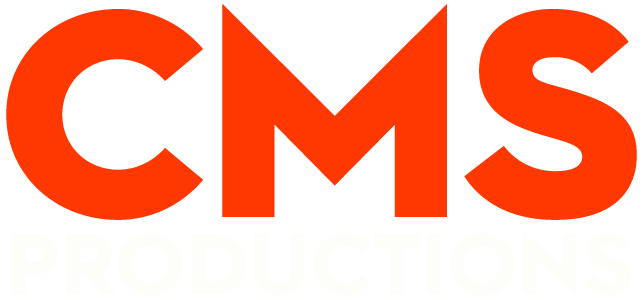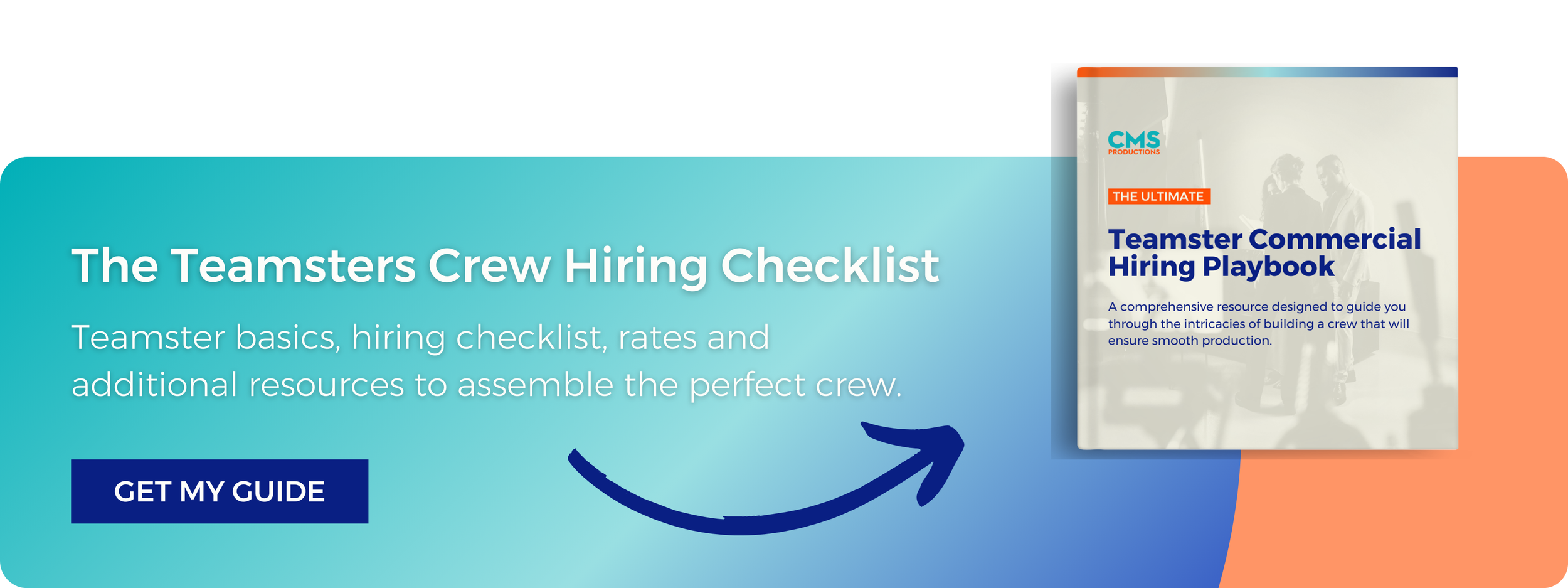The Ultimate Hiring Guide for Teamsters Film Crew for Producers
They may not be on the big screen… but, union crew members play an indispensable role for your commercial productions. From equipment and team members, to professional animal wranglers, they are the heartbeat of your production operations.
However, recruiting union crew for your upcoming production is not as straightforward as it may seem. Unlike working with a non-union crew where you can handpick the members you need, Teamsters operate differently.
So how do you assemble a high-performing union crew for your next production? Below, we'll dive into all the various Teamster film crew members you’ll need for production including the general rates for onboarding your team.
With the Teamster Hiring Guide at your disposal, you’ll have the confidence to hire the perfect team right within your production budget. So let’s begin.
Teamster Basics 101
Working with union crew members can involve working with various entertainment labor unions such as IATSE, DGA, Teamsters and other unions covering different crew members. Working with onboarding crew members such as drivers, vehicle operators or directors, involves working closely with Teamsters..
Teamsters represent their members through various locals within the US, each working closely with productions to negotiate contracts and ensure fair labor practices.
CMS Productions is a signatory to AICP Teamster Local 399, which represents LA and the West Coast) and Local 817, representing (NY and the East Coast), so those are the locals we will cover in this blog.
Teamsters Film Crew Hiring Checklist
Who needs to be covered? Here are the main types of crew members you may need on set covered under Teamsters that require union representation on set:
1. Transportation Captain
Manages all transportation logistics for crew and equipment. They coordinate vehicle availability, arrange crew transport, plan routes, handle logistics for equipment movement, and maintain communication with production teams.
2. Driver - Class A
A professional driver who holds a Class A Commercial Driver’s License (CDL), enabling them to operate large commercial vehicles such as tractor trailers and flatbeds. These drivers are essential in logistics and transportation, ensuring the safe and efficient delivery of goods for the production.
3. Camera Car Driver
A camera car driver assigned to a vehicle equipped with cameras and other recording devices. Their typical job responsibilities include driving the vehicle, operating recording equipment, collecting visual data, technical maintenance and reporting.
4. Production Van Operator
Manages and operates a mobile production unit, this generally includes a van fully equipped with video, audio and broadcasting equipment used for live events, live sports broadcast, news coverage, concerts and other events where on site production is needed.
5. Chapman Crane Operator
Operates and manages the Chapman crane, a camera crane commonly used in films. Their job responsibilities include operating the crane, set up, maintenance, technical knowledge and working closely with the director and cinematographer to work on the creative image.
6. Hyphenate Drivers
A hyphenate driver takes on multiple job roles and production tasks during production.
7. Wrangler
Within the film and entertainment industry, a wrangler refers to a professional on set to manage specific elements on set. There are a few types of wranglers, including:
Animal Wrangler
Prop Wrangler
Costume Wrangler
Child Wrangler
Vehicle Wrangler
Their job responsibilities include training, ensuring safety compliance, on set preparations and coordination. They are important to ensuring a smooth work operation and success of a shoot.
8. Location / Scout Manager
They are responsible for scouting for the ideal location to film for your production.
Their job begins with evaluating and selecting the right set, and further handling negotiation agreements and coordinating the logistics of accessing the location. On site, they will further supervise and act as the main point of contact. During post production, they will ensure the locations are in original condition and wrap up any final paperwork.
AICP Teamster Rates Overview
Union crew member rates vary under the AICP, Teamsters Local 399, and 817 Commercial Agreement depending on driver classification and hours worked. Below we will list the starting wage rates for each Teamster crew member.
AICP Teamsters Local 399 (LA/West Coast) Rates
Transportation Captain: $63.58/hr
Driver - Class A: $54.38/hour
Camera Car Driver: $57.01/hour
Production Van Operator: $58.21/hour
Chapman Crane Operator: $57.01/hour
Wrangler: $54.38/hour
Location / Scout Manager: $885.34 on-call rate
Local 399 & 817 Cheat Sheet
The AICP Teamsters Local 399 and 817 Commercial Agreements are extensive legal contracts that list important terms and regulations that can affect your crew members compensation. It’s important advertisers and producers stay informed with these agreements to avoid added fees or claims. Below we list important features we find most crucial to know about the contracts.
1. Operations
When onboarding Teamsters film crew, ensure their work on set aligns with the job functions and responsibilities as outlined in the agreement to avoid claims.
Workday and Work Week Minimum
It is also just as important to understand the terms to follow under the workday, week and minimum calls to ensure wage rates are paid correctly.
2. Overtime
Each agreement has different overtime rates to apply for each crew member.
3. Travel
Under each agreement there are important terms that apply for location and travel distance for the drivers, reimbursement terms, and extended locations.
4. Rest Periods
Each agreement has their own rest period terms to follow to ensure fair breaks during productions.
5. Holidays
Always check the recognized holidays under each agreement and how holidays are recognized if they fall on the weekend.
6. Cancellation of Work Calls
Don’t cancel on your crew last minute, it will cost you. Failure to notify your crew members within proper time can result in your member still getting paid for the minimum call.
Conclusion: Assemble Teamsters Film Crew Team with Ease
Assembling the right team involves having a clear understanding of the agreement for each crew member. It is crucial for every producer and advertiser to follow their terms and regulations throughout production to stay within your production budget.
For even the most skilled producer, navigating these contracts can be too much to add on top of their production responsibilities. We’re here to help.
CMS Productions is a third-party union signatory signed directly to the AICP Teamsters 399 (LA) and 817 (NY) agreements and can service on most productions.




